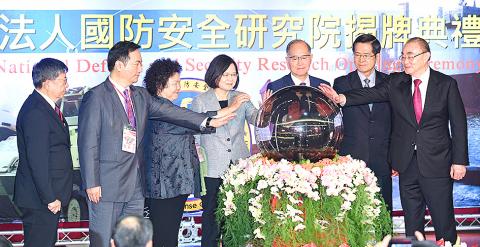President Tsai Ing-wen, former minister of national defense Feng Shih-kuan (馮世寬) and other top officials yesterday in Taipei inaugurated the government-funded Institute for National Defense and Security Research think tank.
Feng is to serve as the institute’s chairman and former Mainland Affairs Council deputy minister Lin Cheng-yi (林正義) as its chief executive officer.
The institute has seven research departments and one research center, and employs 64 people.

Photo: Liu Hsin-de, Taipei Times
It is tasked with administering research programs and international exchange initiatives, and advising the government on national security, military defense policies and regional security, as well as conducting studies on China’s military and political development.
“Taiwan is facing severe challenges in the international arena, and this underscores the necessity for establishing this think tank,” Tsai told the inauguration ceremony.
The president said she has three expectations of the institute: Helping the government stay on top of national security and strategic developments, recruiting and cultivating talent for research in these fields, and serving as a platform for interaction and collaboration with the outside world.
The institute plans to organize international conferences, and publish regular government reports and research papers, she said.
“We will improve the channels for dialogue with other nations in the region and set up a platform for mutual interaction. By enhancing mutual trust on regional security and strategic issues, we can create more possibilities for collaboration with other nations,” Tsai said.
Feng agreed, saying the institute would be an important mechanism for international collaboration and dialogue.
The institute is to have an annual budget of NT$125 million (US$4.2 million) and is to be based at the former headquarters of the Ministry of National Defense on Boai Road and Gueiyang Street near the Presidential Office Building.
The institute has hired 17 full-time researchers, all with doctorates, along with 17 research assistants, all of whom have international study and work experience, Lin said.
They are proficient in English and other regional languages, including Japanese, Korean, Vietnamese and Russian, he said, adding that their security and defense research focus on the nations where these languages are spoken.
The institute is under the auspices of the government and the Legislative Yuan, and is mandated to publish national reports to present to officials and legislators, which includes publications on annual assessments of Taiwan’s national security, advanced military defense technologies and research into the development of the Chinese People’s Liberation Army, Lin said.
The diplomatic corps of Taiwan’s allies, and representatives of other nations with trade offices and consulates in Taipei also attended the ceremony, including several officials from the American Institute in Taiwan.
Former US deputy secretary of state Richard Armitage, along with executives from prominent security think tanks, including the US’ Center for Strategic and International Studies and the UK’s Royal United Service Institute, also sent pre-recorded messages of congratulations.

US climber Alex Honnold is to attempt to scale Taipei 101 without a rope and harness in a live Netflix special on Jan. 24, the streaming platform announced on Wednesday. Accounting for the time difference, the two-hour broadcast of Honnold’s climb, called Skyscraper Live, is to air on Jan. 23 in the US, Netflix said in a statement. Honnold, 40, was the first person ever to free solo climb the 900m El Capitan rock formation in Yosemite National Park — a feat that was recorded and later made into the 2018 documentary film Free Solo. Netflix previewed Skyscraper Live in October, after videos

Starting on Jan. 1, YouBike riders must have insurance to use the service, and a six-month trial of NT$5 coupons under certain conditions would be implemented to balance bike shortages, a joint statement from transportation departments across Taipei, New Taipei City and Taoyuan announced yesterday. The rental bike system operator said that coupons would be offered to riders to rent bikes from full stations, for riders who take out an electric-assisted bike from a full station, and for riders who return a bike to an empty station. All riders with YouBike accounts are automatically eligible for the program, and each membership account

NUMBERS IMBALANCE: More than 4 million Taiwanese have visited China this year, while only about half a million Chinese have visited here Beijing has yet to respond to Taiwan’s requests for negotiation over matters related to the recovery of cross-strait tourism, the Tourism Administration said yesterday. Taiwan’s tourism authority issued the statement after Chinese-language daily the China Times reported yesterday that the government’s policy of banning group tours to China does not stop Taiwanese from visiting the country. As of October, more than 4.2 million had traveled to China this year, exceeding last year. Beijing estimated the number of Taiwanese tourists in China could reach 4.5 million this year. By contrast, only 500,000 Chinese tourists are expected in Taiwan, the report said. The report

Temperatures are forecast to drop steadily as a continental cold air mass moves across Taiwan, with some areas also likely to see heavy rainfall, the Central Weather Administration (CWA) said. From today through early tomorrow, a cold air mass would keep temperatures low across central and northern Taiwan, and the eastern half of Taiwan proper, with isolated brief showers forecast along Keelung’s north coast, Taipei and New Taipei City’s mountainous areas and eastern Taiwan, it said. Lows of 11°C to 15°C are forecast in central and northern Taiwan, Yilan County, and the outlying Kinmen and Lienchiang (Matsu) counties, and 14°C to 17°C